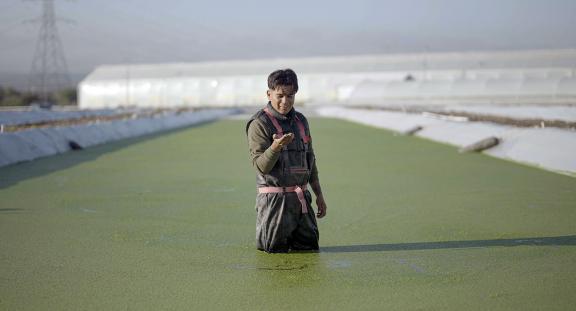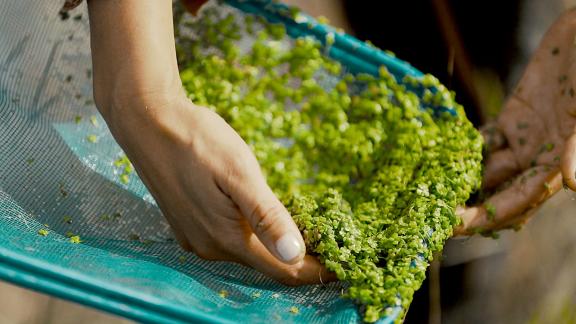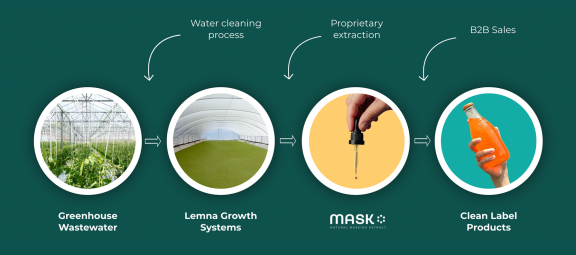Mexico is experiencing more frequent droughts, unpredictable rainfall, and increasing temperatures, which in turn are reducing water availability. The Latin American nation’s glaciers are melting, while rapid urbanisation has outpaced water infrastructure development, exacerbating water scarcity issues across the country.
Agriculture is the largest consumer of water in Mexico, majorly contributing to water pollution, where nitrogen fertiliser becomes a contaminant carrying pesticides, fertilisers, animal waste, and sediments into rivers and aquifers, posing serious health and environmental risks.
“I concentrated all my efforts on solving agricultural wastewater, more specific nutrient runoff, after realising the scale of the issue.”
Inspired by biomimicry—the practice of making technological and industrial designs that copy natural processes—Marissa Cuevas discovered that living organisms could address the water crisis in her country. Marissa’s innovation led to the birth of microTERRA, a technology platform that leverages biotechnology to clean water while creating functional and nutritional ingredients for the plant-based food industry using regenerative agricultural practices.

A catalyst for change
As a promising climate tech start-up, microTERRA received support from CATAL1.5°T (pronounced "catalyst"), a USD 40 million initiative financed by the Green Climate Fund (GCF) and implemented by Deutsche Gesellschaft fuer Internationale Zusammenarbeit (GIZ).
“Participating in the CATAL1.5°T accelerator exposes us to a larger group of corporations, investors, and public organisations who can support our mission.”
The CATALI.5°T initiative supports climate start-ups and young businesses with the highest climate mitigation impact and business growth potential in Latin America and West Africa. The initiative offers various programmes to help start-ups, particularly women-led start-ups, access venture capital more easily.
CATALI.5°T supported microTERRA’s business approach, making the business more competitive and better positioned for fundraising in a challenging business landscape where biotechnology is often overlooked. Participating in the CATAL1.5°T accelerator programme has been a transformative experience for microTERRA, providing essential tools, insights, mentorship, and resources to integrate sustainability into every aspect of their business.
Innovation solving water scarcity
microTERRA’s primary innovation involves Lemna, an aquatic plant that absorbs significant amounts of nitrogen from wastewater and transforms it into functional ingredients that help create zero-sugar and plant-based food products.

Lemna is a tiny aquatic plant with the unique ability to clean water as it grows, simultaneously producing valuable compounds that are extracted to create functional ingredients. Photo: GIZ
“Every kilogram of nitrogen has a climate impact equivalent to 4.3 kgCO2eq. With each hectare of our Lemna growth system, we can remove 58 kg of nitrogen daily, translating to 250 kg of CO2eq.”
By utilising the excess nitrogen from agricultural wastewater, microTERRA avoids the need for additional nitrogen fertilisers, creating a win-win for both the environment and the food industry.
The start-up operates in high water-risk areas of Mexico, like Colón, Querétaro, where hydroponic greenhouses produce nitrate-rich wastewater. microTERRA’s Lemna-based system treats this water while helping protect long-term freshwater resources.
“Our systems reduce water pollution, preserve freshwater resources, and can save billions in health and environmental remediation costs.”

microTERRA is rethinking the way food is produced. The start-up, supported by GCF funding, cleans water while developing products that improve food systems. Pollution stops at the source, upcycling nutrients into ingredients that enhance people’s health. Photo: microTERRA
Looking ahead
Water pollution isn’t the only challenge that microTERRA is tackling.
Lemna transforms absorbed nitrogen into functional and sustainable ingredients, which help to lower sugar content in food and beverages. microTERRA's latest product, Mask, enables food and beverage companies to produce zero-sugar and plant-based products. Mask is a natural extract derived from Lemna that helps reduce sugar in popular food items such as ice cream, beverages, sauces, plant-based meats, and vitamins.
Recognising the global demand for cleaner, healthier plant-protein products, with consumers willing to pay a premium, microTERRA seized the opportunity to upcycle nutrients from Lemna into health-enhancing ingredients.
microTerra is now actively working on regulatory approvals to expand its market reach in the US and Europe.
Story originally published by CATAL1.5°T. Edited by Zeenia Dastur, GCF
—
This story is part of a series featuring climate tech start-ups supported by the CATALI.5°T initiative, a USD 40 million initiative financed by the Green Climate Fund (GCF) and implemented by Deutsche Gesellschaft fuer Internationale Zusammenarbeit (GIZ).
The CATALI.5°T initiative supports climate start-ups and young businesses with the highest climate mitigation impact and business growth potential in Latin America and West Africa.
Explore the other stories in this series: